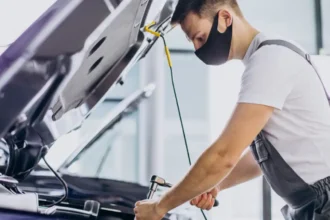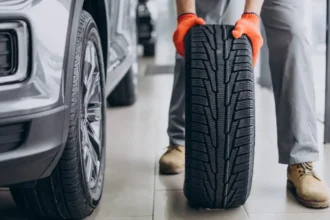5 Myths About Car Maintenance Debunked: Car maintenance is a topic filled with advice, warnings, and plenty of misinformation. Whether you’re a seasoned driver or a new car owner, you’ve probably heard several pieces of advice about how to keep your vehicle running smoothly. However, not all of these tips are rooted in fact—some are simply long-standing myths. These myths can cost you time, money, and even affect your car’s performance.
In this article, we’ll debunk five of the most common car maintenance myths, separate fact from fiction, and provide you with the correct information to help you take better care of your vehicle.
Five of the Most Common Car Maintenance Myths
Myth #1: You Must Change Your Oil Every 3,000 Miles
One of the most common car maintenance myths is the idea that you need to change your oil every 3,000 miles. This was solid advice in the past, but it’s outdated for most modern vehicles.
Fact: Thanks to advancements in engine technology and oil formulations, most cars today can go between 5,000 to 10,000 miles (or more) between oil changes. The best way to determine how often your oil needs changing is to consult your car’s owner’s manual. Follow the manufacturer’s guidelines rather than relying on this old myth.
| Old Rule | New Standard |
|---|---|
| Oil change every 3,000 miles | Oil change every 5,000-10,000 miles |
Why It Matters: Sticking to the old 3,000-mile rule may result in unnecessary oil changes, which means more time and money spent at the mechanic’s. Following your manufacturer’s recommendation is the best practice.
Myth #2: Premium Fuel Is Always Better for Your Car
Many drivers assume that using premium fuel will improve their car’s performance, regardless of what type of car they drive.
Fact: If your car doesn’t specifically require premium fuel (as outlined in your owner’s manual), using it won’t offer any benefits. In fact, using premium fuel in a vehicle that doesn’t need it can be a waste of money. Premium fuel is formulated for high-performance engines that require higher octane levels to prevent knocking, but regular cars don’t benefit from this.
Read More: 10 Best Tools for DIY Car Maintenance
When to Use Premium: Only use premium fuel if your car’s manufacturer recommends or requires it. For most vehicles, regular unleaded fuel is perfectly sufficient.
Myth #3: Tire Pressure Doesn’t Need Regular Checking
Some drivers believe that tire pressure is something that only needs to be checked when a tire looks visibly low.
Fact: Tire pressure should be checked regularly, even if your tires appear fine. In fact, a tire can be underinflated by as much as 10 PSI without appearing flat to the naked eye. Driving with low tire pressure can lead to decreased fuel efficiency, poor handling, and increased wear and tear on your tires.
| Ideal Tire Pressure Check Frequency |
|---|
| At least once a month, and before long trips |
Why It Matters: Keeping your tires properly inflated helps maintain optimal fuel efficiency, ensures better handling, and extends the life of your tires. It’s a simple but important part of regular car maintenance.
Myth #4: You Can Use Water Instead of Coolant in Your Radiator
Some people assume that topping off their radiator with plain water is an acceptable substitute for coolant, especially in a pinch.
Fact: While you can temporarily use water in an emergency, it’s not a long-term solution. Coolant, also known as antifreeze, contains chemicals that protect your engine from overheating in hot weather and freezing in cold conditions. It also prevents corrosion in the engine and radiator. Water lacks these protective properties, and over time, it can cause damage to your engine.
Why It Matters: Using the correct coolant mixture is vital to your engine’s longevity and performance. Always use the recommended 50/50 mix of coolant and water to ensure your engine is properly protected.
Myth #5: Brake Fluid Never Needs to Be Changed
Brake fluid is often one of the most overlooked aspects of car maintenance, and some drivers believe it never needs changing unless there’s a problem.
Fact: Brake fluid is hygroscopic, meaning it absorbs moisture over time, which can lead to corrosion in the brake system and reduced braking performance. Most manufacturers recommend changing your brake fluid every 2 to 3 years or as specified in your vehicle’s owner’s manual.
| Myth | Fact |
|---|---|
| Brake fluid lasts the life of the car | Brake fluid should be changed every 2-3 years |
Why It Matters: Neglecting brake fluid changes can lead to serious brake issues and compromise your vehicle’s safety. Regular brake fluid changes are essential to maintaining a responsive, safe braking system.
Table: Common Car Maintenance Myths vs. Facts

| Myth | Fact |
|---|---|
| Change your oil every 3,000 miles | Most cars can go 5,000-10,000 miles between oil changes |
| Premium fuel is better for all cars | Use premium only if your car’s manual recommends it |
| Tire pressure only needs checking when tires look flat | Check tire pressure monthly |
| Water can replace coolant in your radiator | Coolant is necessary to prevent overheating and freezing |
| Brake fluid never needs changing | Brake fluid should be changed every 2-3 years |
FAQs on Car Maintenance Myths Debunked
Q1: Can I really wait 10,000 miles between oil changes?
A: Yes, if your car’s manufacturer recommends it. Many newer vehicles are designed to go longer between oil changes, thanks to advances in oil technology and engine design. Always check your owner’s manual for the recommended interval.
Q2: Will premium fuel improve my car’s performance?
A: Only if your car requires premium fuel. For most vehicles, regular fuel is all you need. Using premium fuel unnecessarily won’t improve performance and could cost you more at the pump.
Q3: How often should I check my tire pressure?
A: Ideally, tire pressure should be checked once a month and before long trips. Keeping your tires properly inflated improves fuel efficiency and extends their lifespan.
Q4: Is it okay to use water in my radiator in an emergency?
A: While you can use water in a pinch, it’s important to replace it with the correct coolant mixture as soon as possible. Coolant helps regulate engine temperature and prevents corrosion, which water alone can’t do.
Q5: Does brake fluid really need to be changed?
A: Yes, brake fluid absorbs moisture over time, which can lead to corrosion in your brake system and reduced braking performance. It should be changed every 2 to 3 years.
Final Thoughts: Separating Car Maintenance Myths from Facts
Car maintenance myths can lead to unnecessary expenses and, in some cases, even damage to your vehicle. By debunking these common myths and relying on the facts, you can take better care of your car, extend its lifespan, and avoid costly repairs. Remember, the best source of information is always your vehicle’s owner’s manual, which outlines the specific maintenance schedule and recommendations for your car.
Don’t let myths dictate how you maintain your vehicle—stick with the facts for a smoother, safer, and more cost-effective ride.








